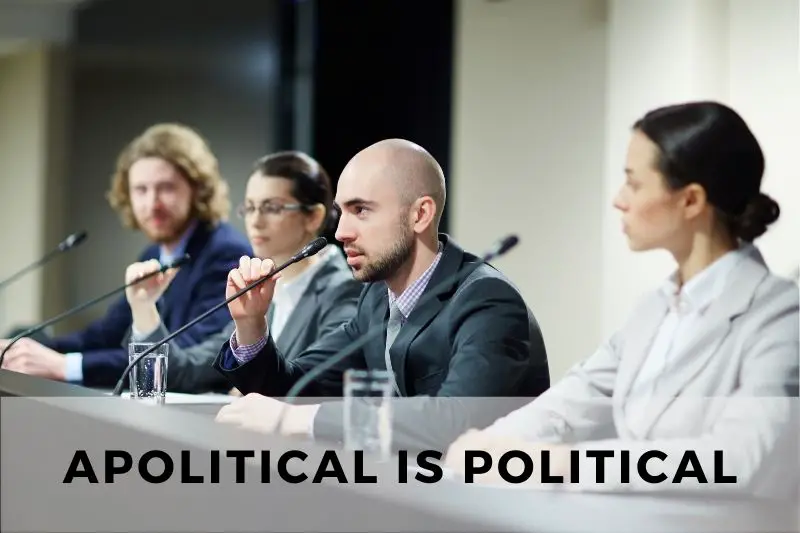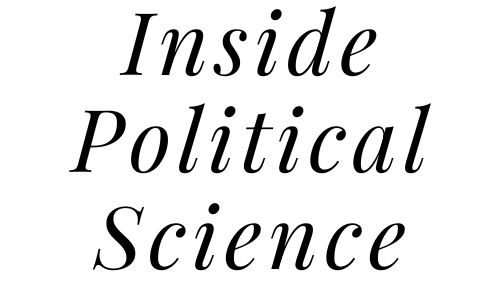
In today’s complex world, the concept of neutrality often appears as a safe haven, a position free from the tumultuous waves of political discourse. However, this apparent neutrality is merely an illusion, as being apolitical is, in itself, a political stance.
To be apolitical is to choose not to engage in political matters actively. But this choice carries weight and consequences, shaping societal structures and power dynamics. In this article, we will explore the depth of this illusion, unraveling why being apolitical is, in fact, a deeply political stance with significant impacts on society.
What Does Being Apolitical Mean?
To understand why being apolitical is political, we first need to grasp the concept of apolitical itself. Being apolitical means choosing not to participate in or be concerned with political activities, issues, or ideologies. It is often seen as a stance of neutrality, a way to avoid controversy or conflict. However, this neutrality is deceptive, as it overlooks the inherent political nature of such a position.
Choosing Not to Engage
Apolitical individuals consciously decide to refrain from involvement in political matters. This decision may stem from various reasons, such as a desire to focus on personal life, a belief that politics is inherently divisive, or a lack of interest in political affairs.
Ignoring Political Dimensions
Being apolitical often involves disregarding the political dimensions of everyday life. This can include overlooking how personal actions and decisions can have political implications or failing to recognize the broader societal impacts of political systems and structures.
Illusion of Neutrality
Many people view apolitical individuals as neutral parties, unswayed by political biases or agendas. However, this perception fails to acknowledge that choosing not to engage is, in itself, a political stance—one that can have significant repercussions.
Overlooking Political Consequences
Apolitical individuals may underestimate the impact of their choice to remain uninvolved. By failing to participate in political processes, they inadvertently contribute to the maintenance of existing power dynamics and inequalities.
Perceived Safety
For some, being apolitical is a way to avoid the perceived dangers of engaging in politics, such as conflict or backlash. However, this avoidance does not eliminate the political nature of their stance; it merely masks it.
Apathy or Disillusionment
Apolitical individuals may also be motivated by apathy or disillusionment with the political system. They may feel that their voice or actions will not make a difference, leading them to disengage entirely.
By examining the various facets of being apolitical, we can begin to unravel the complexity of this stance and understand why it is inherently political.
10 Reasons Why Apolitical Is Political
Being apolitical may seem like a passive stance, but it has active implications in shaping societal norms and power dynamics. Here are ten reasons why apolitical is political:
#1. Maintains the Status Quo
Apolitical individuals often inadvertently support the status quo by not challenging existing power structures or advocating for change. Their inaction can perpetuate systems of oppression and inequality.
Examples:
- A company executive who chooses not to engage in discussions about diversity and inclusion may inadvertently perpetuate a culture that favors the majority group.
- A citizen who does not vote in elections allows the current political party in power to maintain its position without challenge, regardless of its policies’ impact on marginalized communities.
#2. Reinforces Inequality
By not engaging in political discourse, apolitical individuals may fail to address or even acknowledge systemic inequalities. This lack of awareness or action can contribute to the perpetuation of these inequalities.
Examples:
- Ignoring discussions about healthcare disparities can lead to a lack of support for policies that aim to address these disparities, leaving marginalized communities without adequate healthcare access.
- Not participating in debates about affordable housing can result in a lack of advocacy for policies that would provide housing opportunities for low-income individuals and families.
#3. Silences Marginalized Voices
Apolitical individuals may unintentionally silence marginalized voices by not amplifying or supporting their causes. This silence can further marginalize already disadvantaged groups.
Examples:
- Not sharing or promoting the voices of activists from marginalized communities on social media can limit the reach and impact of their advocacy efforts.
- Choosing not to attend or support events that raise awareness about issues affecting marginalized groups can contribute to the invisibility of these issues in broader society.
#4. Perpetuates Injustice
Without active engagement in political processes, apolitical individuals may allow injustices to persist unchecked. Their inaction can contribute to the perpetuation of social, economic, and political injustices.
Examples:
- Failing to challenge discriminatory practices in the workplace can result in the continued mistreatment and exclusion of minority employees.
- Not advocating for policy changes to address environmental racism can lead to the ongoing pollution and health hazards faced by communities of color living near industrial sites.
#5. Privilege and Neutrality
Apolitical individuals, particularly those from privileged backgrounds, may see their apolitical stance as a form of neutrality. However, this neutrality often aligns with the interests of the privileged and can perpetuate inequalities.
Examples:
- A wealthy individual who does not engage in discussions about wealth distribution may benefit from economic policies that maintain their wealth while widening the wealth gap.
- A white person who does not actively challenge racist attitudes or policies may passively benefit from a system that privileges whiteness.
#6. Legitimizes Harmful Policies
Apolitical individuals’ lack of engagement can legitimize harmful policies by creating a perception of public acceptance. Without opposition, policies that discriminate against certain groups or undermine human rights may continue unchallenged.
Examples:
- Not speaking out against discriminatory immigration policies can give the impression that such policies have widespread support, leading to their perpetuation.
- Failing to protest against laws that restrict access to reproductive healthcare can contribute to the normalization of these restrictions, further limiting individuals’ rights.
#7. Denies Accountability
Apolitical individuals may avoid taking responsibility for the consequences of political decisions by distancing themselves from political processes. This lack of accountability can allow injustices to occur without facing consequences.
Examples:
- Not holding elected officials accountable for their actions can lead to a lack of oversight and transparency in government.
- Ignoring the impact of consumer choices on the environment can contribute to environmental degradation without acknowledging personal responsibility.
#8. Undermines Democracy
Apolitical behavior can undermine democratic principles by reducing participation in democratic processes. When a significant portion of the population remains apolitical, the democratic system may fail to represent the interests of all citizens.
Examples:
- Low voter turnout in elections can result in governments that do not reflect the diverse views and needs of the population.
- A lack of participation in community decision-making processes can lead to policies that benefit only a select few, rather than the entire community.
#9. Supports Authoritarianism
Apolitical attitudes can create an environment conducive to authoritarianism by weakening the opposition to authoritarian leaders or policies. Without a strong commitment to democratic values, societies may be more susceptible to authoritarian rule.
Examples:
- Not challenging efforts to restrict freedom of speech can embolden authoritarian leaders to further limit dissenting voices.
- Ignoring signs of government corruption can allow authoritarian leaders to consolidate power without facing resistance.
#10. Fails to Address Global Challenges
Apolitical individuals may overlook or ignore global challenges that require collective action, such as climate change, human rights violations, and global health crises. By not engaging in efforts to address these challenges, they may contribute to their exacerbation.
Examples:
- Ignoring calls for environmental conservation can lead to continued degradation of the planet, affecting not only current but also future generations.
- Failing to support humanitarian efforts in regions affected by conflict or natural disasters can result in increased suffering and loss of life.
Closing Thoughts
In conclusion, the illusion of neutrality surrounding apolitical behavior must be debunked. Being apolitical is not a neutral stance; it is a choice with profound political implications. By choosing to remain apolitical, individuals inadvertently contribute to maintaining the status quo, reinforcing inequality, and silencing marginalized voices.
They legitimize harmful policies, deny accountability, undermine democracy, and support authoritarianism. Moreover, they fail to address pressing global challenges. It is essential to recognize the political nature of apolitical behavior and understand its far-reaching consequences. To create a more just and equitable society, active engagement in political processes and advocacy for meaningful change are necessary.
